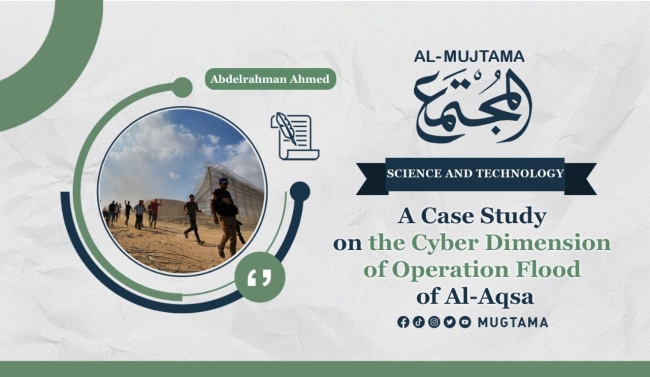-
You are here:
- Home
- More
- Science and Technology
Cyber Flood of Al-Aqsa: The Horror Awaiting Israel
- font size decrease font size increase font size
On October 7th of last year, an unprecedented event occurred that took both Israelis and the entire world by surprise. The military wing of the Islamic Resistance Movement "Hamas," known as the Izz ad-Din al-Qassam Brigades, launched the "Operation Flood of Al-Aqsa," where its fighters entered settlements near the Gaza Strip in a unique military operation. Since that date, Israel has been facing a flood of "cyber" attacks from hackers supporting the Palestinian cause, representing various nationalities and operating from different countries.
A group of Palestinian hackers, self-identified as "Cyber Flood of Al-Aqsa," incorporating the emblem of the Izz ad-Din al-Qassam Brigades alongside their own logo, claimed to have sent threats to all Israeli institutions about hacking and piracy. Subsequently, this hacker group published details of some of these attacks through its social media accounts.
In a later statement, the group announced the successful breach of several websites linked to the Israeli Ministry of Defense, acquiring a database containing information about reservists and soldiers, including their numbers and other sensitive details. The group declared its intention to gradually reveal these details and threatened to use the acquired data in other attack campaigns.
The "Cyber Flood of Al-Aqsa" group also declared its disruption of the operation of numerous Israeli government websites and others affiliated with media institutions. However, they did not specify the nature of the information they obtained; instead, they presented a list of websites before and after the breaches.
According to the group's statement, they managed to hack into surveillance systems in various Israeli cities and neighborhoods, as well as infiltrating the surveillance and control systems of numerous settlers' homes, broadcasting content related to supporting the resistance. They published other materials highlighting their main targets, including the Israeli police website, from which they claimed to have obtained sensitive data.
The group did not disclose the nature of the breached data but shared an image of the hacked website through its social media accounts.
It's worth noting that these cyber attacks succeeded in disabling more than 100 websites, including the official website of the Israeli Intelligence Agency, coinciding with the launch of "Operation Flood of Al-Aqsa."
The "Recorded Future" company, specializing in cyber information monitoring, stated that cyber attacks on Israeli websites and applications have increased in frequency since the beginning of the "Operation Flood of Al-Aqsa." Groups of hackers opposed to Israeli policies managed to target the well-known Israeli site "Jerusalem Post" and disrupt its operation for varying periods in recent days.
While information about the consequences of the cyber operations is limited, the group "Anonymous" known for its support of the Islamic Resistance Movement (Hamas) announced through its Telegram channel that it successfully disabled the Israeli emergency alert application. The "Falcon Video" platform, specializing in tracking cyber threats for small and medium-sized companies, reported on its X platform (formerly Twitter) that an electronic hacking group calling itself the "Electronic Tiger Unit" sent warnings to Israel and other Middle Eastern countries supporting Israel, indicating its intention to carry out potential cyber attacks against them.
The Electronic Tiger Unit, whose nationality remains undisclosed, previously targeted the Israeli Intelligence Agency (Mossad) through a "Distributed Denial of Service" (DDoS) attack, which stops websites attacking it, halts access to the website, and prevents it from providing any service to the public. Despite Israel's focus on cyber warfare, an attack managed to disable the Israeli Meteorological Service website (Reuters), stopping more than 100 websites, including the official website of the Israeli Intelligence Agency, simultaneously with the launch of "Operation Flood of Al-Aqsa." The unit announced this on its Telegram channel, threatening that these attacks would extend to include Arab countries supporting Israel.
Another group of activists from Bangladesh, calling themselves "System Admin BD," carried out a similar attack on Israeli websites, causing the Israeli Meteorological Service website to go offline, but it was later restored by the authorities. The attacks did not only target the Israeli side, as a group of pro-Israeli hackers from India, known as "Indian Cyber Force," on October 8th, disabled the official electronic website of the Islamic Resistance Movement (Hamas), justifying their actions by stating that their work supports the idea of peace in the Middle East, and they attack only websites that support war.
The same group attacked the website of "Alpha Net," the largest company in the Gaza Strip providing electronic services, conducting organized campaigns on the company's servers that led to the freezing of part of the infrastructure in the sector. The hackers took control of the IP address distributing more than 5,000 servers in the Gaza Strip, explaining the internet outage on October 8th. According to the group's statement, their motivation for launching electronic attacks is their hatred for war and the desire to stop it. Similar to how Israel attacked Gaza in the past, it now attacks Gaza, which is home to many members of the Hamas movement.
The "Palestinian Ghosts" group, which has breached numerous Israeli websites, called on hackers worldwide to attack the infrastructure, whether private or public, of Israel and the United States.
Follow Us internal


